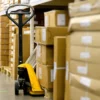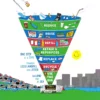Recommerce is a word that you’ll see more and more. As businesses become increasingly aware of how they have an impact on the environment and how they can contribute to being more sustainable.
From well known, high street brands to independent stores, one thing ties them together and that is the environment.
Businesses are beginning to recognise the importance of developing environmentally friendly products, production processes and operations. Building a sustainable brand is an attractive prospect for many reasons. Start-up businesses are at a distinct advantage here because they can build their entire business model on sustainability and use this to their advantage when it comes to marketing.
Recommerce is closely linked to the circular economy whereby the lifecycle of a product is extended for as long as possible. Rather than an item such as a piece of clothing, an electronic device or a homeware item being discarded and ending up in landfill, it will be sent to a dedicated facility where it will be dismantled, upcycled, reused, refurbished or recycled.
Once this process is complete it can then be resold, often in an ‘as new’ condition. Consumers profit from a lower cost product and businesses are able to profit from products that would otherwise have gone to waste. It’s a popular model and there are many ways in which it can be implemented.
Brand Development for Sustainability
There isn’t a one size fits all approach to building a sustainable brand and there certainly isn’t a right and a wrong way. Success depends on careful planning, an understanding of the market and an evaluation of every area of the business from products to packaging, operations to logistics and recognising how each of these can be as sustainable as possible.
The growth of the fast fashion industry in recent years has sparked much debate about the huge amounts of waste it generates. This has placed an increasing amount of pressure on businesses to be more mindful of the way in which they package, present and produce their products. Customers have started to change their buying preferences too, shifting to more environmentally friendly brands.
Emerging trends such as recommerce are growing rapidly and are proving extremely popular in the world of retail. The word ‘recommerce’ is used to describe the use of previously owned items or extending the lifespan of items that are no longer needed. It can apply to every product imaginable from clothing through to electronics.
Second Hand the new ‘New’.
Recommerce is in demand.
Not only with businesses who want to become more environmentally friendly but for customers too. It is an effective option that builds on the idea of a sustainable business model and is far removed from the harmful, throwaway culture.
The circular economy and recommerce is reshaping the world of retail with resale, thrifting or even rental becoming increasingly popular. When consumers have the ability to access resale options from retailers, they often spend more and return more often. This is because stock turnover takes place much more frequently than it does with brand new products. Many new businesses in particular are building their entire business model on the second-hand market and it’s not only attractive to consumers, but also proving profitable for the business too.
Recommerce initiatives will place greater emphasis on things such as reusing products, recycling or buyback schemes. These are all great ways to reduce and where possible eliminate waste, being kinder on the environment while extending the lifespan of products.
The concept of recommerce is completely shifting perceptions of second-hand items. Second hand is becoming more and more desirable.
Consumers now regard second hand as valuable and even luxury brands are embracing the recommerce trend, allowing their products to be made accessible to a much wider audience. The growth in demand for second-hand goods has driven up prices and increased competition. Businesses are investing more in recommerce and innovating to offer new ways for customers to shop.
Increase Value
As customers demand better products, higher quality standards and a commitment to eco-friendly packaging and operations, businesses must be more and more creative to produce products at a lower cost. The idea of recommerce is one of the best ways to achieve this. Surplus stock can be reused, and unwanted items collected, refurbished and resold for a profit. This concept is better from an ethical point of view, it is kinder on the environment and fits in well with values of sustainability.
Refurbished Products
If recommerce is to prove successful, it must be profitable for businesses. If it is to be profitable then it must be popular. Retailers are being increasingly innovative to tailor the recommerce model to fit their business and the products they sell. As more businesses adopt this model, they are thinking of new and creative ways to refurbish items or extend their lifespan. Initiatives such as ‘buyback’ websites are emerging and are proving popular too.
A New Way
Even charity shops are embracing the recommerce market. An increasing number of charity shops are operating online with communities popping up online promoting the sale of second-hand items, from the normal to the unusual. Charities are partnering with well known brands to add more weight to the recommerce idea.
Awareness
One of the reasons why recommerce is proving so popular with businesses and consumers alike is because of the financial benefits that it can bring. Products sold through a recommerce business model are often much cheaper than they would be to buy new. That said, many refurbished or upcycled items can be in an ‘as new’ condition so there are some great savings to be made.
As people become more aware of recommerce and get on board with the concept, it will only prove to be more beneficial on the environment in the long term.
Recommerce is only set to expand further in the months, years and decades to come.
It is an idea that all retailers should embrace, from small, independent retailers to larger, well established brands. All businesses can benefit with recommerce as part of their business strategy.



